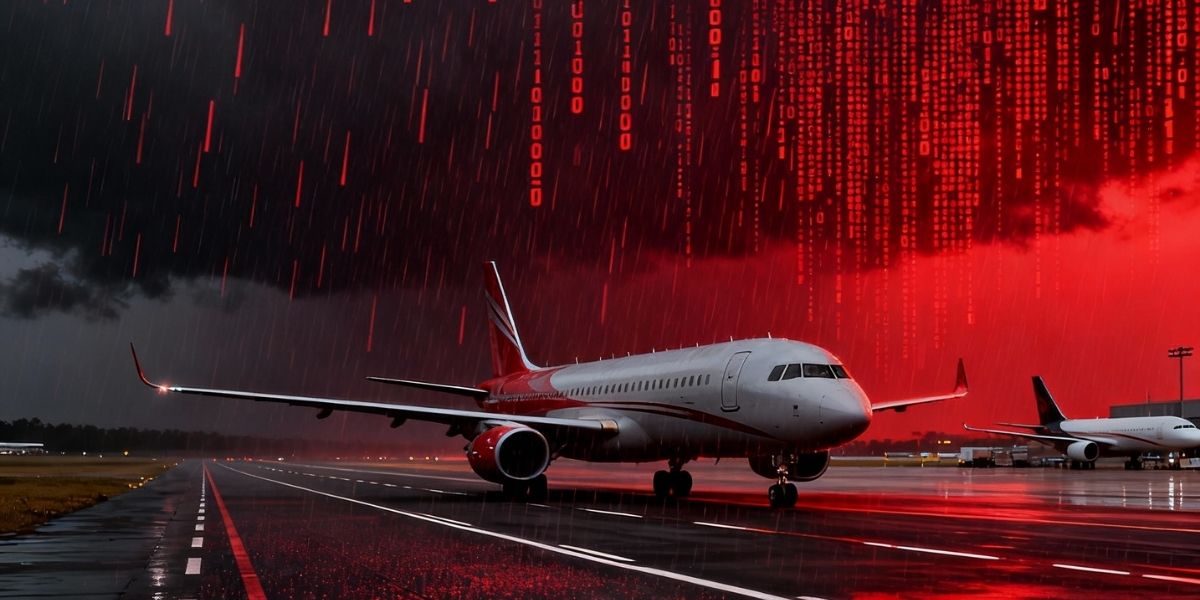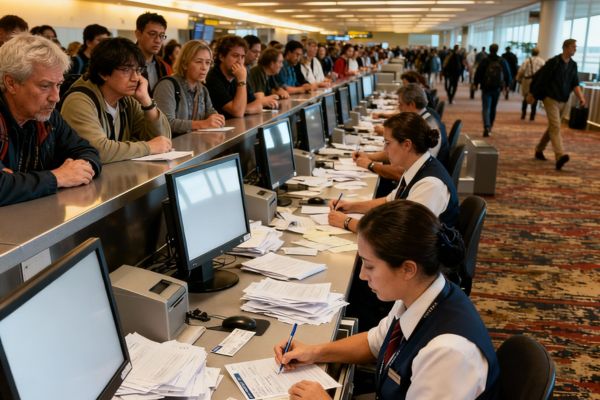When the Sky Falls - How Hackers Grounded Europe's Biggest Airports
A single cyberattack brought Heathrow, Brussels, and Berlin to their knees. Thousands stranded, flights cancelled, and chaos at check-in desks. Here's what happened and why every business should be worried.

When the Sky Falls: How Hackers Grounded Europe's Biggest Airports
What happened when digital systems failed at 30,000 feet
The Scene: Friday Night Chaos
Imagine arriving at the airport to find:
- All check-in screens completely black
- Staff writing boarding passes by hand
- Hundreds of travelers stuck in massive queues
- Your flight? Cancelled.
This nightmare became reality on Friday, September 20th, 2025 when hackers launched a coordinated attack that brought Europe's busiest airports to their knees.
One target. One attack. Three major airports down.
The scary part? It could happen to any business that relies on digital systems.
What Actually Happened
Friday, September 20th - The Digital Dominos Fall
Late Friday evening: Hackers infiltrated Collins Aerospace's computer systems, targeting their MUSE check-in software that powers dozens of airlines across Europe.
The genius move: Instead of attacking each airport individually, they hit the one company that serves them all.
Result: Check-in systems crashed simultaneously at:
- London Heathrow (29 flights cancelled by Saturday morning)
- Brussels Airport (45 flights cancelled, 90-minute delays)
- Berlin Brandenburg (complete manual operations)
Saturday, September 21st - Chaos Erupts
What passengers saw:
- Black screens where flight information should be
- Airport staff frantically writing boarding passes with pens
- Security lines backing up for hours
- No way to verify tickets or track baggage
What staff had to do:
- Manually check every passenger against paper lists
- Guess seat assignments without computer records
- Hand-write baggage tags and hope for the best
- Process thousands of angry travelers with 1990s methods

Airport screens down, staff doing manual check‑in
Official Response and Recovery Timeline
Collins Aerospace Statement: Parent company RTX acknowledged a "cyber-related disruption" affecting "select airports" and said it was working to resolve the issue quickly.
UK Transport Secretary Heidi Alexander: "I'm aware of an incident affecting airline check-in and boarding... I'm getting regular updates and monitoring the situation."
European Commission Response: Officials said they were "closely monitoring the cyber attack" but noted no evidence of "widespread severe" impact.
Recovery Progress:
- Saturday-Sunday: Gradual system restoration with continued delays
- Monday, September 23rd: Most systems back online, but passenger disruption continues
- Ongoing: Investigation by European cybersecurity agencies and law enforcement
Why This Attack Was So Effective
The Supply Chain Strategy
Instead of breaking into individual airports (which would be harder), hackers targeted one company that powers them all.
Think of it like poisoning the water company instead of breaking into each house separately.
The result: Maximum damage with minimum effort.
Perfect Timing and Target
Why Collins Aerospace MUSE system?
- Powers check-in for dozens of major airlines
- Single point of failure for entire airport operations
- When it goes down, everything stops
- No meaningful backup systems in place
Why Friday night?
- Weekend travel peaks mean maximum passenger impact
- Fewer IT staff available for emergency response
- More pressure for quick ransom payment
- Maximum media coverage and chaos
The Hidden Business Lesson
This wasn't just an airport story - it's a warning for every business.
Your Business Probably Looks Like This:
| System You Depend On | What Happens If It Fails |
|---|---|
| Payment Processing | Can't accept credit cards, lose all sales |
| Customer Database | No access to client information or order history |
| Email/Communication | Can't reach customers, suppliers, or staff |
| Inventory Management | Don't know what you have in stock |
| Accounting Software | Can't process payroll, invoices, or payments |
The Questions You Should Ask Right Now:
- What if our main software stopped working tomorrow?
- Could we serve customers without computers for a day? A week?
- Do we know which third-party companies power our critical systems?
- What's our backup plan if our suppliers get hacked?
Most businesses can't answer these questions. That's the real problem.
What Airports Should Have Done (And Didn't)
Missing Backup Systems
- No secondary check-in software from different vendors
- Staff untrained on manual procedures
- No paper-based backup processes ready to deploy
- Complete dependency on single digital system
Poor Crisis Communication
- Passengers left in the dark for hours
- Conflicting information from airport vs airline staff
- No clear timeline for resolution
- Social media updates lagged behind reality
Inadequate Vendor Oversight
- No real-time monitoring of Collins Aerospace system health
- Unclear incident response coordination with software provider
- Missing contractual requirements for cyber incident notification
How to Protect Your Business (Lessons from the Sky)
Step 1: Map Your Critical Dependencies
List every system your business needs to operate:
- What software do you use daily?
- Which suppliers power your essential operations?
- What happens if each system fails?
- Do you have alternatives ready?
Step 2: Build Real Backup Plans
For each critical system:
- How would you operate without it for 24 hours?
- Do you have manual procedures documented?
- Are staff trained on emergency alternatives?
- Can you switch to backup systems quickly?
Step 3: Monitor Your Vendors
Don't just trust - verify:
- What's your vendor's cybersecurity track record?
- How quickly do they notify customers of incidents?
- What's their disaster recovery plan?
- Do they have cyber insurance to cover your losses?
Step 4: Practice Emergency Scenarios
Monthly drills should include:
- Operating without your main software
- Communicating with customers during outages
- Switching to backup systems
- Coordinating with staff and suppliers
The Bigger Picture: Why This Matters
For Critical Infrastructure
This attack proved that shared digital systems create shared vulnerabilities. One company's security failure can cascade across entire industries.
For Businesses
The more digital your operations, the more vulnerable you become. But unlike airports, small businesses rarely have backup plans or manual alternatives ready.
For Hackers
This attack's success will inspire copycat attacks on other shared infrastructure providers. Expect similar incidents targeting payment processors, cloud services, and business software platforms.
Your Emergency Action Plan
This Week:
- List your critical systems - What do you absolutely need to operate?
- Identify single points of failure - Which systems have no backups?
- Contact your key vendors - Ask about their cybersecurity and incident response
- Document one manual process - Pick your most critical task and figure out how to do it without computers
This Month:
- Get a cybersecurity assessment from a professional
- Create written emergency procedures for your most important systems
- Train your team on at least one backup process
- Review your business insurance for cyber incident coverage
Before Year-End:
- Implement monitoring for your critical systems
- Establish relationships with backup vendors for essential services
- Conduct quarterly emergency drills with your team
- Create a communications plan for customer/supplier outages
The Wake-Up Call
The hackers who grounded Europe's airports exposed a harsh truth: Modern businesses are incredibly fragile.
One attack on the right shared system can bring down entire industries.
But here's what the airports got wrong - they had no Plan B. No backup systems. No manual procedures. No way to operate when the computers died.
Your business doesn't have to make the same mistake.
The companies that survive the next wave of cyber attacks won't be the ones with the best technology - they'll be the ones with the best backup plans.
Don't wait for your systems to crash to start preparing.
Worried your business could be next?
LimitBreakIT helps Malta companies build cyber resilience before attacks happen. We've helped dozens of businesses avoid disasters just like this airport incident.
📞 Emergency Cybersecurity Assessment: +356 9940 2975
📧 Quick Security Questions: security@limitbreakit.com
🛡️ 24/7 Incident Response: Emergency cyber support hotline
The next cyberattack is coming. The only question is: will your business be ready?